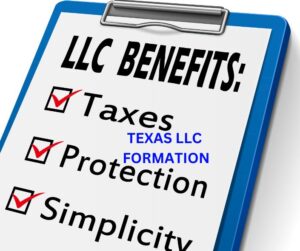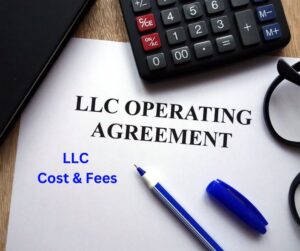A Limited Liability Company (LLC) is one of the most popular business structures for entrepreneurs in Texas due to its flexibility, limited liability protection, and favorable tax treatment. Forming an LLC in Texas involves several key steps that ensure legal compliance and optimal structure for your business needs. This guide will walk you through each step, from choosing a business name to obtaining necessary licenses, to help you successfully launch your LLC in the Lone Star State. Call our office if you need help with your LLC.
Step 1: Choose a Name for your LLC
Choosing the right name for your LLC is not only an important branding exercise but also a legal necessity in Texas. The name you choose must be distinguishable from other business names already registered with the Texas Secretary of State and must include “Limited Liability Company,” “Limited Company,” or abbreviations like “LLC” or “LC.”
What are the requirements for naming an LLC in Texas?

To ensure your chosen name is available, conduct a name search on the Texas Secretary of State’s website. If the name is available, you can reserve it for a period of time until you are ready to file your formation documents. This reservation can prevent other entities from registering your chosen name while you prepare the necessary paperwork.
Step 2: Appoint a Registered Agent
A registered agent is legally required for every LLC in Texas. This agent is responsible for receiving official communications, including legal documents and government correspondence on behalf of your LLC.
Who can be a registered agent for an LLC in Texas?
A registered agent in Texas must be a resident individual or a business entity authorized to do business in Texas. The agent must have a physical street address in the state (P.O. boxes are not acceptable) where they can receive documents during normal business hours.
Choose a reliable registered agent who is consistently available at the registered office during business hours. This could be yourself, another member of your LLC, or a professional registered agent service. If choosing a service, ensure they have a good reputation and can handle legal and tax documents competently.
Hailey-Petty Law Firm can help with all of your estate planning needs.
Step 3: File the Certificate of Formation
Filing the Certificate of Formation officially registers your LLC with the State of Texas. This document lays the foundation for your business’s legal structure.
What information needs to be included in the Certificate of Formation?
The Certificate of Formation must include the LLC’s official name, the registered agent’s name and address, the LLC’s mailing address, and the names of the organizers. You can also specify whether the LLC will be managed by members or managers.
You can file your Certificate of Formation online through the Texas Secretary of State’s website, or you can mail in the completed form. There is a filing fee associated with this document, which must be paid at the time of filing. Ensure all information is accurate and complete to avoid delays.
Step 4: Create an Operating Agreement
Though not legally required in Texas, creating an operating agreement is highly advisable for any LLC. This internal document outlines the governance structure and operational procedures of your LLC.
Is an operating agreement required in Texas?
No, Texas does not require LLCs to have an operating agreement, but having one is beneficial. It can help ensure all members are clear about their roles and responsibilities and provide for smoother resolution of disputes.
Draft an operating agreement that covers capital contributions, profit distributions, member responsibilities, and procedures for adding or removing members. Consulting with a lawyer to help draft or review this document can prevent future legal issues and ensure that the agreement meets all members’ needs.
Texas LLC Formation FAQ
How much does it cost to form an LLC in Texas?
Can a single person form an LLC in Texas?
Do I need a lawyer to form an LLC in Texas?
Do You Need to Form an LLC as Part of Your Estate Plan?
Forming an LLC in Texas involves careful consideration and thorough preparation. By following these steps, you can ensure that your LLC is legally compliant and structured to meet your business needs. Each step, from naming your LLC to drafting an operating agreement, plays a crucial role in laying a strong foundation for your business.
Find an LLC Lawyer Near Me
If you are considering forming an LLC in Texas and need further guidance or have specific questions, consider consulting with a business attorney who specializes in Texas corporate law. They can provide personalized advice and ensure that your LLC formation goes smoothly and meets all legal requirements.

